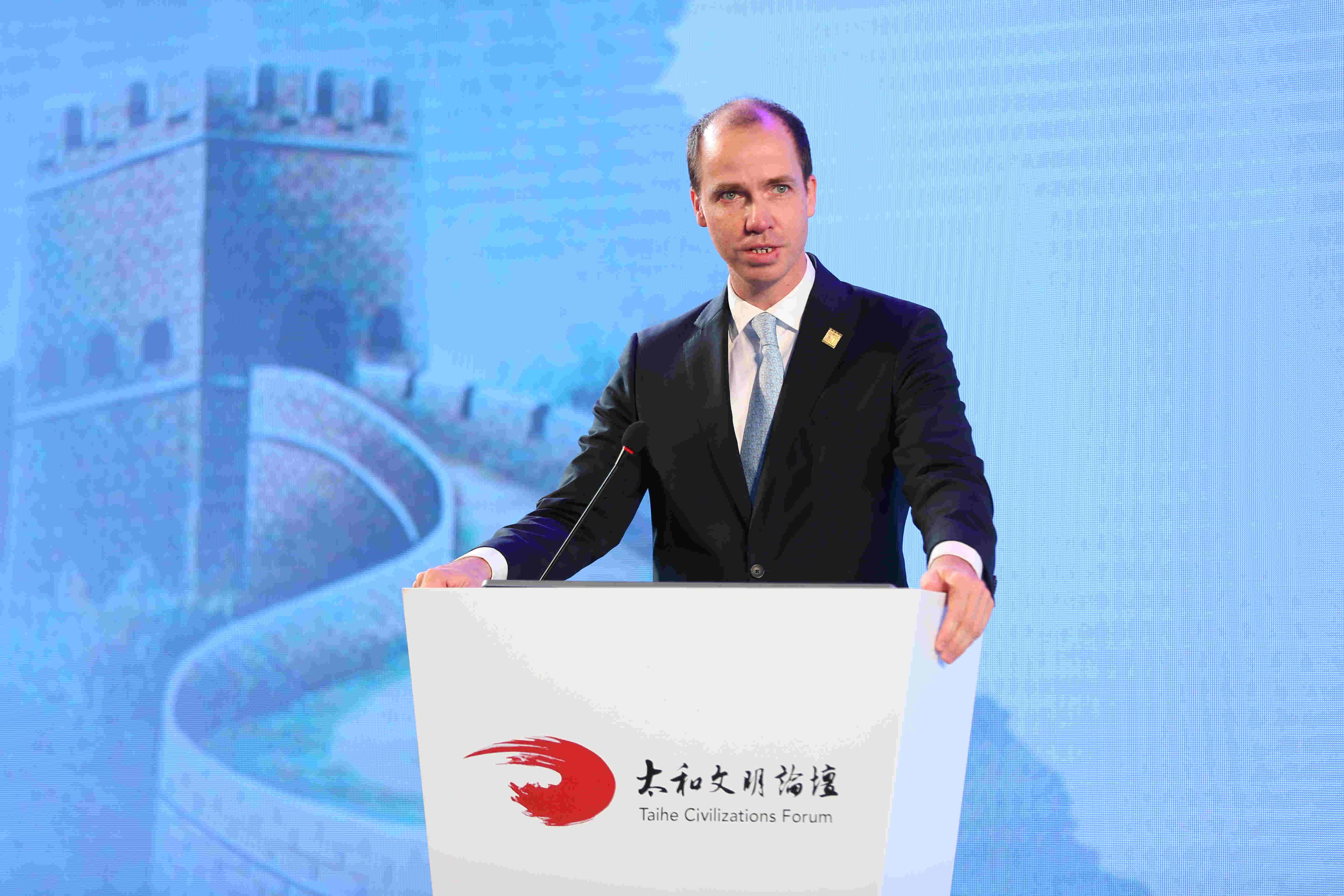It appears that we are increasingly witnessing what Samuel Huntington once called the "clash of civilizations," a clash between different cultures, religions, and ways of life in certain parts of the word. We even see the decay of common values altogether. However, values, rituals, symbols, narratives—that is, the very fabrics of culture-provide meaning and are existential to our individual and collective identities.
One of the three themes we are going to address this afternoon is people-to- people exchange. Deepening people-to-people exchange and bonds will become even more important given the increasing mass migration within and across borders. Migration will further intensify the tensions between cultures, but it can also contribute to mutual understanding and for sharing and developing joined values. The ancient Silk Road is frequently mentioned these days as an example of the peaceful coexistence of different cultures.
When we discuss people-to-people exchange this afternoon, keep in mind the question of what causes and what is affected by today's civilizational clashes
Is the clash due to cross-cultural differences or due to the effect of other, equally fundamental processes? Mass-migration and cultural exclusion are the results of economic globalization, server material inequality, poverty, un- and underemployment, geopolitical tension, war, and climate change. Cultural clashes happen in our mind due to other causes that have nothing to do with the cultural "other."

Obviously, today's civilizational clashes do not signal Francis Fukuyama's "end of history" and not the victory of liberal-democratic, Western capitalism. With China's rise since its reform, history has just begun or resumed. However, something else looms large in the future that might put an end to history. It relates to the second theme of our civilizations forum, and that is the rapid advancement of technologies; in particular, the advancement of artificial intelligence, robotics, and the merging between organic and non-organic systems. No doubt, advanced digitalization will improve our lives as technical progress has done in the past. However, if we believe the predictions—as put forward by scholars like Yuval Noah Harari in his book Homo Deus—we might well be approaching the end of our humanist history. All past industrial revolutions replaced old jobs with new jobs and new skills, but never directly competed against the human brain. Agrarian peasants are replaced by factory workers, and factory workers are replaced by service and knowledge workers. However, what will come after knowledge work and after the third industry? Artificial intelligence will directly compete against the human brain's function, which has made possible the previous revolutions and the emergence of AI. Now, the human brain and humanism might turn against itself. Such projections of "singularity" do not leave much space for utopian thoughts. In the meantime, there will be winners of this 4th industrial revolution, certainly those companies and countries who will set the new standards and own and control the data and algorithms.
The third and final theme of our conference explores climate change and sustainability. This issue is no less urgent or less complex, but technology could actually support climate action and prevent the continuous degradation of our planet. However, some scholars claim that a 3- to 4-degree Celsius temperature increase and 0.6-meter sea level rise by the end of this century are inevitable and would completely alter the way we inhabit our planet today—given that we are still human by 2100. In the meantime, however, we will witness more and more climate change-related disasters, damages, and social costs. For the first time, the need for climate action reached an international consensus at the Earth Summit in Rio in 1994 and cumulated with the celebrated the Paris Agreement in December 2015. Nevertheless, CO2 emissions have continued to skyrocket and so has one undeniable, dominant cause of global warming. Before the Paris Agreement, China was the culprit of international climate action. Now China has become the potential driving force behind overcoming the lack of global stewardship for climate action and sustainable development.
Ladies and gentlemen, my dear friends, on behalf of the Taihe Institute, I wish you many insightful and controversial, yet constructive discussions this afternoon and tomorrow. Come up with some tangible results by the end of this forum. Please keep in mind, the ancient Chinese word "taihe" stands for supreme harmony. Let us find intelligible and actionable ways of restoring taihe.
-

- Part of the Guests Interview Videos of the Taihe... 16 September , 2017
-

- Keynote Speech——Cheng Li 01 September , 2017
-

- Keynote Speech——Liru Cui 02 September , 2017
-

- Keynote Speech——Yifan Ding 03 September , 2017
-
2017 Content Highlights
-

- Scott Beaumont Scott Beaumont is the President of Google Greater China, overseeing Google's...
-

- Thorsten Jelinek Thorsten Jelinek is the Managing Director of Polyterra, a research and...
-

- Stephen Orlins Stephen Orlins has been President of the National Committee on U.S.-China...
-

- Da Wei Da Wei is the director and a Fellow of the Institute of American Studies of ...
